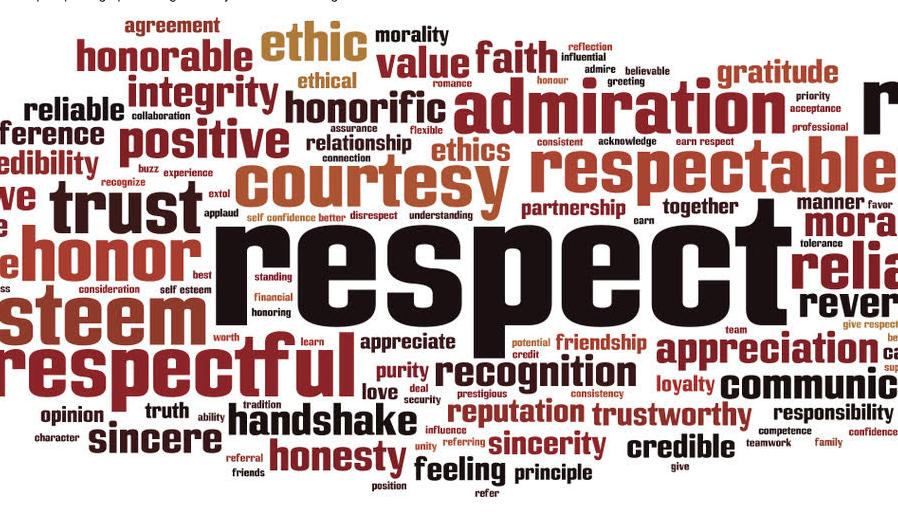”Every human being, of whatever origin, of whatever station, deserves respect. We must each respect others even as we respect ourselves.” –Ralph Waldo Emerson
The sensory assault continues on our sensibilities with workplace harassment stories involving abusive behavior as well as the ongoing drumbeat of chicanery now leading to indictments and confessions of criminal conduct. Buffeted by these stories, an epiphany occurred that our nation is in serious need of a respect infusion!
My search for better understanding of respect lead me to the Emerson quote. It also lead me to a very fine book about respect by Sara Lawrence-Lightfoot. She traces the respect shown by some of the most compassionate people you will find on the planet and uses her journey to enlighten the reader about how respect for others affects lives.
I’ve long thought that the degree to which an individual respects others relates directly to early family experiences. My parents definitely instilled this important value in our family. Certainly, there are people now deeply respectful of others who came to embrace this value without the benefit of being raised to appreciate its importance.
Which leads to a question: If respect for others really could make a difference in the way we lead our lives, how do we infuse this value more successfully into our culture?
Importantly, the stories in the headlines reflect only a small fraction of leaders in business and government. And, many of our leaders accept and embrace the value in their own leadership roles. In fact, I found this take on “respect” from a leading figure in Hollywood, Jeffrey Katzenberg:
“By definition if there’s leadership, it means there are followers, and you’re only as good as the followers,” Katzenberg said. “I believe the quality of the followers is in direct correlation to the respect you hold them in. It’s not how much they respect you that is most important. It’s actually how much you respect them. It’s everything.”
So, we should not let the actions of a few cast a cloud on the many. Still, we can and should do better. The recent stories have caused people to reflect on what some call “awkward situations” they have been placed in during their careers. Some feel powerless to take actions, and others walk away; however, these actions will not aid in changing the culture and enhancing the value of respect.
The truth is, if we want more emphasis placed on respect across the board from the workplace to how people lead their daily lives interacting with others, we need a concerted and conscious effort.
There are some interesting ways of going about this these days. Uber, as all users know, allows riders to rate drivers. What not as many people know is that drivers rate their passengers, too. I suspect disrespectful behavior gets you a low score.
What if the same was adopted by OpenTable where millions of reservations are made at restaurants? What if a restauranteur was tipped off to diners who show great respect to wait staff? Would that begin to shape behavior?
Performance evaluations are given to all level of executives and employees today. Why not inquire about whether the people working in a company feel respected by their leadership? Shouldn’t a board of directors be interested in knowing this? In fact, when hiring someone, would it not be useful to have some kind of “respect score” considered in an evaluation.
I really do not know why some people dining in a restaurant use phrases including “please” and “thank you,” while others favor “get me” or “I want it now.” While either approach works, one clearly makes for a better experience.
And, maybe here lies an important clue we should pay attention to on a larger scale. If disrespectful behavior works for too many people, we may get more of that kind of bad behavior.
I’d like to take a stand IN FAVOR of respectful behaviors and it may take finding more creative ways to reward this kind of desired and thoughtful approach if we are going to reduce unacceptable, disrespectful behaviors.
Thanks for reading these thoughts!
Craig Fuller served four years in the White House as assistant to President Reagan for Cabinet Affairs, followed by four years as chief of staff to Vice President George H.W. Bush. Having been engaged in five presidential campaigns and run public affairs firms and associations in Washington, D.C., he now resides on the Eastern Shore with his wife Karen.



Amy Haines says
Nicely articulated, Craig! Thank you for the mindful and thoughtful perspective. A solid and effective leader can only be successful if they are guided by principles grounded in ethics, morality, fairness and respect which should be practiced in both public and private conduct. A great leader also leads without arrogance and without the pursuit of power. They lead with the intent of improving the lives around them and revel in the success of others and their good fortune.